- Bernard Preston homepage
- Honey Mead
- Natural Vs Organic Wine and Mead
Natural vs organic wine and mead
This page on natural vs organic wine and mead concerns how the fruit was grown, if any honey used was heated and whether these alcoholic beverages have been pasteurised.
Slowly the message is getting through. Whether our lives are going to be frequently touched by disease, pain and disability is mostly to do with lifestyle; and an early death too, of course. What we eat and how we exercise are paramount. But what about the liquids we drink? Are they also kosher?
The subject is vast; in this essay we'll stick to wines, including those made with honey known as a mead.
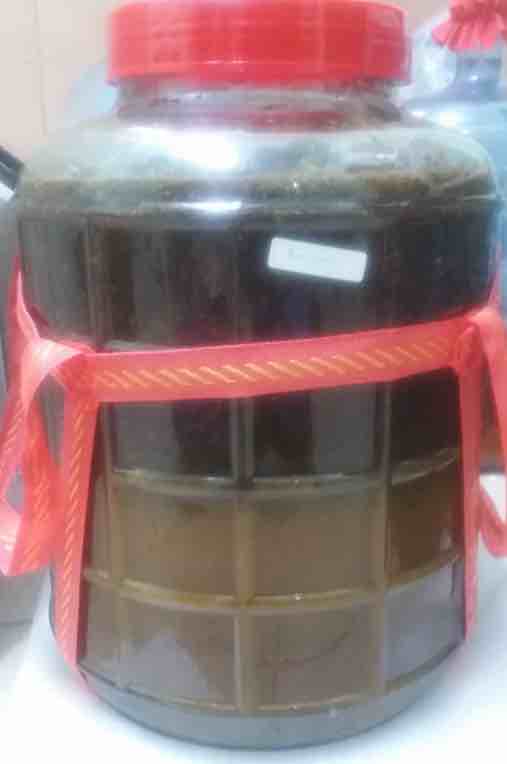 All-hive mead fermenting in a carboy
All-hive mead fermenting in a carboy“People eat organic but haven’t expanded their thinking to drinking natural wines.”
- Véronique Raskin
Organic wine and mead
Wines and meads are made from the fermenting of natural sugars by yeast cells to produce alcohol and carbon-dioxide; they use many different fruits, predominantly grapes and the honey from bees.
As we probably know grapes and fruit in general are amongst the most heavily sprayed crops of all; toxic residues remain in the products. Strawberries are top of the pops.
Whilst it's now absolutely proven that these biocides cause blood cancers, the neurodegenerative conditions and colony collapse disease, farming methods have not evolved so that we can produce food on a massive scale without them.
Agricultural workers are the most vulnerable. In France for example the government has officially recognised that they are prone to Parkinson's Disease, the fastest growing neurodegenerative condition worldwide. One in four elderly persons in China are now apparently affected.
Organic wines are produced from grapes that have been grown using natural fertilisers; and fruit that has not been sprayed with fungicides. It is more labour intensive and you can expect to pay extra; but they cost far less than the treatment for leukaemia or Parkinson's Disease.
Organic honey does not exist as we have no control over which flowers the bees can visit; but it's widely accepted that less pesticides are used in urban areas than in farmlands.
City honey from flowers in gardens has far less toxic ecocides like Roundup that is now fingered as the chief cause of Colony Collapse Disease; the brains of the bees are poisoned so that they cannot find their way home.
Natural wine, mead and cider
Natural wine and mead should not contain any preservatives; particularly added sulphites which have been fingered in many illnesses, mostly in asthmatics.
The fermenting process does produce small amounts of sulphite naturally.
Truly natural wines and meads also are not pasteurised; then they are rich sources of friendly yeast cells that contribute to the microbiome. To get them you probably either have to go directly to the brewery or ferment them yourself.
This natural apple cider is really very simple to brew at home. It's only for those who have access to organic fruit from a known source; probably your own garden.
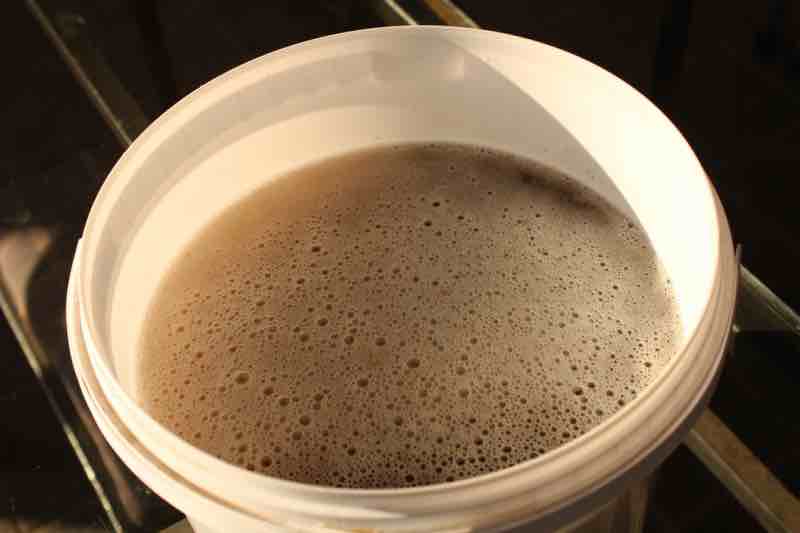 Fermenting apple cider
Fermenting apple ciderNatural honey
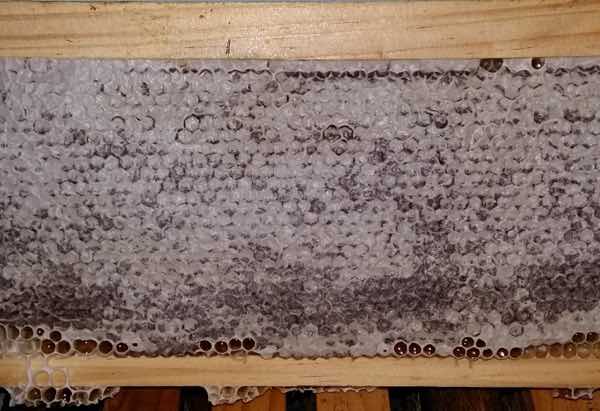 Fully-capped natural comb
Fully-capped natural combToday it seems that almost every food and drink has been processed in some way. The bran and germ are extracted from flour; wines are pasteurised and preserved with sulphite. Honey is strained to remove all the pollen and heated before bottling so it remains clear. They have been spoiled to make acquiring and producing them easier; at great cost to our wellness.
The lignans in the bran prevent most types of malignant breast and prostate tumours; the friendly yeast cells help prevent infection by Candida and contribute to our immunity. And natural honey surprisingly lowers blood glucose in diabetics.
The only control that beekeepers have to ensure their honey is organic is to choose apiary sites that are distant from commercial agriculture. They have to brew their own tipple if they want natural meads.
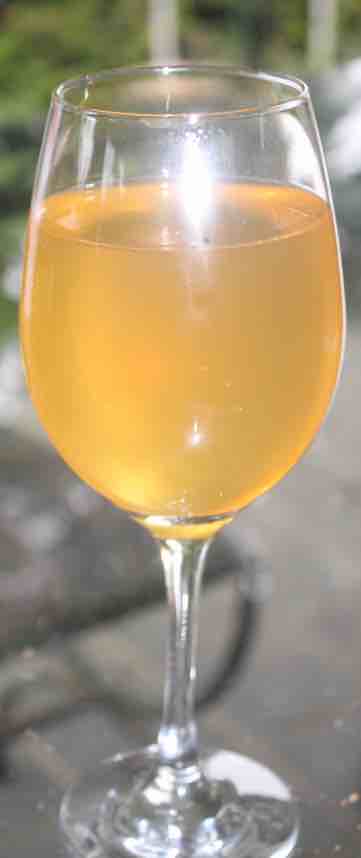
This natural, organic spicy peppadew mead has been fermented from honey gleaned from hives in a small village; there are no vast fields sprayed with toxic poisons in the neighbourhood. The fruit is grown in our garden using only compost for fertiliser. It has not been pasteurised, nor sulphites added. It is a rich probiotic.
When fruit is used to make a mead technically it is known as a melomel; from a pepper it is called a capsicumel.
For those serious about natural vs organic wine and mead you have to spend more time or money; but then far less on the doctor and pharmacist.
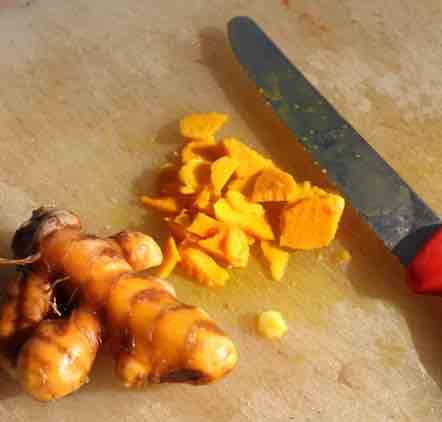
I simply don't have the time
As we have gotten older it has dawned on us that time is a commodity that is running out; the hour-glass is dipping dangerously. Our priorities change. Wellness, disability and losing our marbles all come into a new focus.
Too late cry some, realising the irreversible damage has already been done. For more fortunate people the awakening comes early in life that the best person to care for the self is not the doctor; it is we ourselves.
The dentist cannot floss your teeth for you, nor can the chiropractor do your lower back exercises; your doctor can't ensure that the food and wines found in your home are mainly natural and organic.
In the huge struggle over natural vs organic wine and mead we have realised that making time for wellness is more sensible that spending even more consulting doctors and pharmacists.
Wine and mead as carcinogens
It is a proven fact that even small amounts of commercial wine increase the likelihood of cancer, particularly of the breast. Almost 50 people die every day in the UK alone from a malignant tumour directly caused by alcohol.
Yet the astonishing fact is that in four of the five Blue Zones of the world where healthy old age is the norm, they have weighed the debate about natural vs organic wine and mead; and imbibe every single day.
Meantime we dare not dismiss researchers emphatic statement that tobacco, obesity and alcohol are the three leading preventable causes of cancer.
What does organic wine mean?
The question "what does organic wine mean" has to be answered in two parts.
Firstly the grapes and other fruit in a melomel have to be grown organically; that means with no artificial fertilisers, herbicides and insect-repellents. Instead natural compost and animal manures are used to feed the plants. Frequently sheep and poultry wander through the vineyards and orchards keeping the vegetation down and supplying their droppings.
And secondly no added sulphites are used to preserve the organic wines and meads.
It's a moot point whether organic wines and meads can be described as healthy; they still contain roughly the same amount of alcohol.
Is organic wine better for you? The most honest answer is that it's not as bad for you, is certainly more friendly towards the environment and since it is a probiotic may actually be claimed to be good for you. That cannot be proven until substantial numbers of people start choosing them over their commercial counterparts.
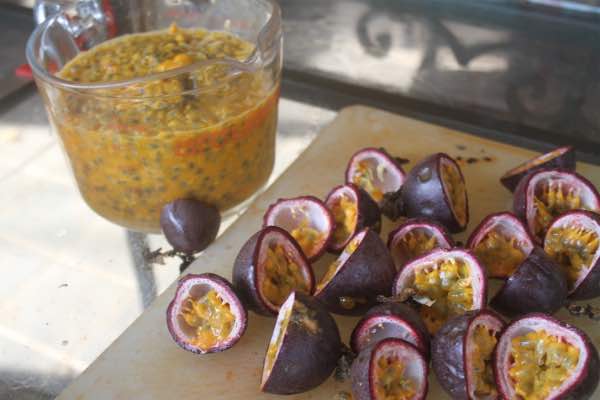 Make meads with what's in season
Make meads with what's in seasonNatural vs organic wine and mead
Natural vs organic wine and mead also looks at how the product is processed and whether any honey used has been heated.
When browsing use right click and "Open Link in New Tab" or you may get a bad gateway signal.
Newsletter
Our newsletter is entitled "create a cyan zone" at your home, preserving both yourself and Mother Earth for future generations; and the family too, of course. We promise not to spam you with daily emails promoting various products. You may get an occasional nudge to buy one of my books.
Here are the back issues.
- Lifestyle and ideal body weight
- What are ultra-processed foods?
- Investing in long-term health
- Diseases from plastic exposure
- Intensive lifestyle management for obesity has limited value
- A world largely devoid of Parkinson's Disease
- The impact of friendly bacteria in the tum on the prevention of cancer
- There's a hole in the bucket
- Everyone is talking about weight loss drugs
- Pull the sweet tooth
- If you suffer from heartburn plant a susu
- Refined maize meal and stunting
- Should agriculture and industry get priority for water and electricity?
- Nature is calling
- Mill your own flour
- Bake your own sourdough bread
- Microplastics from our water
- Alternative types of water storage
- Wear your clothes out
- Comfort foods
- Create a bee-friendly environment
- Go to bed slightly hungry
- Keep bees
- Blue zone folk are religious
- Reduce plastic waste
- Family is important
- What can go in compost?
- Grow broad beans for longevity
- Harvest and store sunshine
- Blue zone exercise
- Harvest and store your rainwater
- Create a cyan zone at your home
Did you find this page interesting? How about forwarding it to a friendly book or food junkie? Better still, a social media tick would help.
- Bernard Preston homepage
- Honey Mead
- Natural Vs Organic Wine and Mead
Address:
56 Groenekloof Rd,
Hilton, KZN
South Africa
Website:
https://www.bernard-preston.com